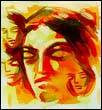The Rediff Special / Venu Menon
The New Outcastes
 The hair has started to grow back on the tonsured heads, marking
the passage of time. Three months have gone by since that desolate
dusk when the menfolk of a picturesque village in Malappuram in
North Kerala gathered to perform a grisly ritual of male bonding.
The hair has started to grow back on the tonsured heads, marking
the passage of time. Three months have gone by since that desolate
dusk when the menfolk of a picturesque village in Malappuram in
North Kerala gathered to perform a grisly ritual of male bonding.
Rasheeda and Mymoona lost more than their hair that night. The
razors that went to work on them cut deeper than the scalp. They
ripped through their very identity as women.
It is an identity that society will not easily restore to them.
The morning after the torture, Mymoona was orphaned by her family.
No one went to fetch her from the police station where she was
detained for two days. Her mother and brothers disowned her and
took custody of her two little daughters, Fasina, 6, and Jessina,
7.
Rasheeda was luckier. She was welcomed by her TB-stricken father
and frail mother, and her eight brothers and sisters. She slipped
into the cocoon of family life to mute the trauma of that November
night. She quickly regained her zest for life.
Mymoona chose to die. She lay on her back on the road and waited
to be crushed under a speeding truck.
Mohammed Aslam is a primary school teacher in Kadanammanna on
the suburbs of Malappuram town. He was overseeing the noon meal
arrangements for the children when someone came up to him and
said a woman was lying on the road and holding up the traffic.
A crowd had gathered. Aslam chided the onlookers. A teacher is
a man of standing in the Muslim community in Malappuram. Aslam
quickly took charge of the situation.
He went up to the woman and firmly told her to get up. ''I want
to see my children, " she said. He promised to arrange that,
but only if she gave up her suicidal course. She relented.
Aslam helped Mymoona to the side of the road and sat her down on
a stone bench. The crowd was aghast. Then he did the unthinkable.
He instructed a shopkeeper to bring her a glass of water. "The
woman is a prostitute and she has AIDS,'' protested the man.
In the town of Malappuram, claustrophobic with chauvinist pride,
Mymoona and Rasheeda are hateful symbols of the AIDS pandemic.
The tonsure ceremony of November 12, 1996 enacted by the members
of a citizens council formed to enforce moral standards represented
a cathartic act of social cleansing.
For the men assembled that night under the blazing neon of collective
hysteria, the mission was self-evident; Prostitution is a vehicle
for disease and death. A prostitute defiles her body, then defiles
the body politic. Tonsure strikes at the heat of 'deviant' womanhood.
It is an act of disfigurement that diminishes a woman and defines
the mob's psychology of reform.
This was the imperative at work when the two women were bound
to iron poles and subjected to a ritual of disfigurement. This
was the message that was beamed through the rousing speeches of
the ring leaders 'A citizens council has been formed to stop immoral
women from plying their trade in our locality. Two cases have
been brought before the council. We must decide on a suitable
punishment.'
'Shave their heads,' suggested a voice from the 200 strong crowd,
The suggestion was carried.
Local barbers were pressed into services. Recalls N P Moideen,
who used his razor on Mymoona: ''The whole business was over by
9 pm."
But the women were not let off. They sat huddled for hours, heads
covered, surrounded by men who kept up a flurry of kicks and punches.
The women were too weary to react, recalls an eye-witness.
Around two in the morning they were pushed into vehicles and taken
to the Malappuram police station. Their tormentors accompanied
them.
Mymoona and Rasheeda were kept under what the police term 'surveillance'
for two days, during which time they were sent to the Manjeri
government hospital to test for AIDS. The hospital reported a
negative result to the police and the women were released.
But doubts persisted. Rasheeda was linked by gossip to Mammunni,
a Gulf returnee who had been admitted to the Manjeri government hospital
with fullblown AIDS, and died shortly afterward. Hospital authorities
confirmed that Rasheeda figured among the women listed in a diary
kept by the man.
Tell us what you think of this report
|





